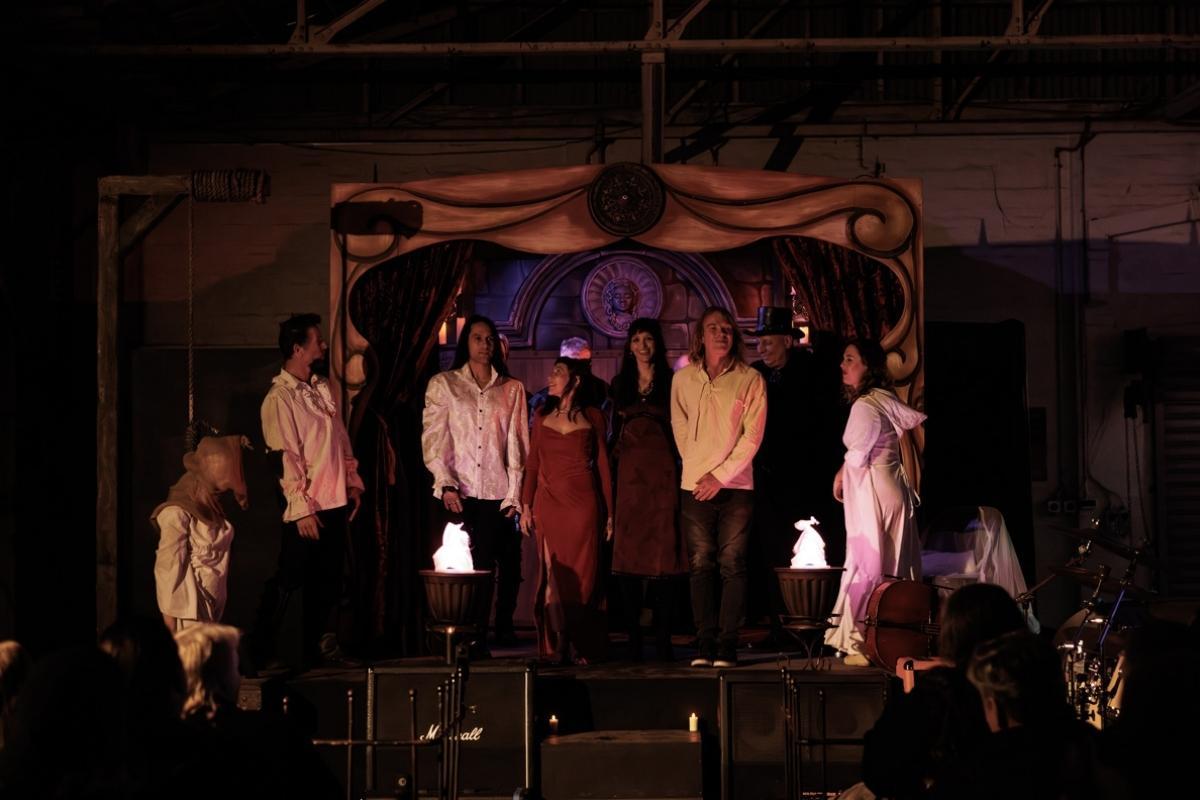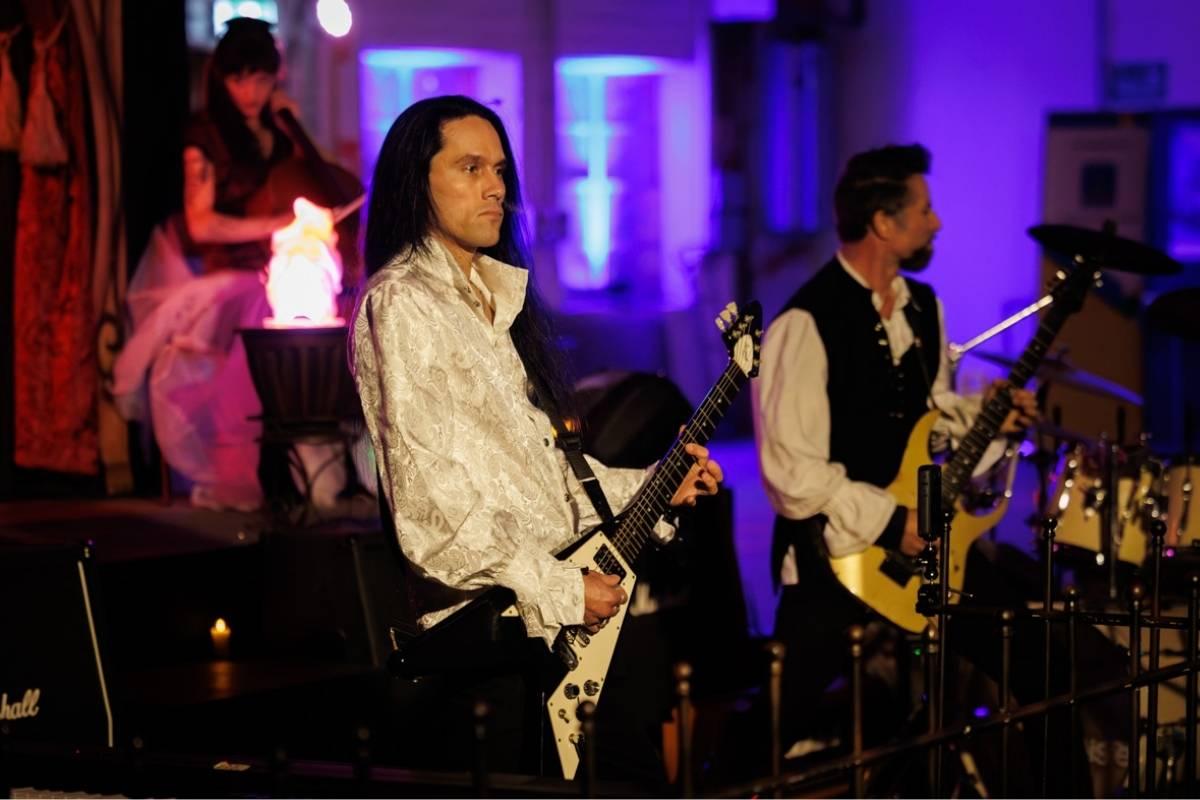Arriving at the Paint Factory, Yeronga with not much time to spare, I quickly identify the outdoor bar and meeting place for patrons for tonight’s (1 August) show, 'The Tragic Tale Of Dr Faustus'. An adaptation, written, directed and composed by, David ‘Bud’ Beckett.
I am ushered up a small set of stairs into a cement-floored warehouse—the resting place for the set built for tonight’s dark performance.
Stepping inside, I spot the merch table and a selfie backdrop decorated with skulls along the side of the temporary stage. Already feeling a shift in air as I encounter the sound of lamenting strings and something thick and old hanging in the cold venue—smelling like dust and secrets. Perfect.
Sepulchre Serenade is conjuring more than a performance tonight – it is summoning a fully-fledged nightmare stitched from poetry, metal, and gothic hellscape in a dark and rough industrial setting and within the first few minutes of soaking in the instrumental dirge, I can see that it works.
Check out our gallery.
A red carpet divides two banks of patron seating in front of wrought iron cemetery fencing, and leads the eye to a centred gate. It is open to the space where Jason Roussell sits still behind his kit on one side and Beckett’s guitar and amp. Jay Klein Kleinschmidt behind keys on the other side with axes and amps close by. My gaze continues up a set of steps to the stage where Samantha Knudsen is on cello just outside the stage cavern cloaked behind black curtains.
I settle in to ‘The Lament of Dr Faustus Pt. 1’ crawling out first, dripping melancholy. ‘Darkness Falls Pt 1’ Eva Fritz, tonight’s Elizabeth Bathory, also on cello. David ‘Bud’ Beckett, the creator of the show, is playing acoustic guitar and adds depth to the aural sentience from inside the set. Behind them, three robed and hooded priests stand.
The strings wail like a funeral procession lost in fog it conjures feels of Friedrich’s famous 'Abbey In The Oakwood'. Everyone sinking into the atmosphere. No distractions – everyone surrendering to the performance from the get go.
‘Darkness Falls Pt 2’ sweeping through next, slow and ceremonial, then exploding when Fritz as Elizabeth Bathory, animates her character. She is fluid in her movements like a blood painting – menacing, no lyrics necessary, we understand that evil settles on the set.

Image © Clea-Marie Thorne
With the scene set it now unfolds like ordered chaos. Vocals break the instrumental pieces now ‘The Garden Of Love’. Characters entering the audience space multiple times, drawing us into the abyss. Beckett has slipped into the doomed skin of Dr Faustus, playing the art worn and raw, like a man clawing at his own skin trying to crawl out of himself. Easily conveying that he is wanting more than the world can give.
Samantha Wolstenholme’s Miranda sings like lace and steel, all purity at first, shimmering through Blake’s ‘Garden Of Love’. Ahh the poetry echoes. “… and priests in black gowns were walking their rounds, and binding with briars my joys and desires.” Before tangling us in darker harmonies.
Kristian James sneers his way onstage as Matthew Hopkins – smug, powerful, rotten. Stamping his name on Miranda like property while calling for fire and nooses. When he catches her with Faustus, the energy in the room turns ugly. Him hissing “witch”. The word, her death sentence and we all know what’s coming.
The hanging scene not flashy – just honest. Bare and brutal. The release sees the body plunge to a neck-snapping spectacle. The body left hanging slack from the gallows. Hearing the cello under it all is absolutely wrecking.
Faustus clutching her hanged corpse. Everything inside him breaking. We see Bathory has joined Kleinschmidt to take up double duties playing bass beneath the hanging scene, her character relishing the despair above her.
The second that Faustus calls for Mephistopheles, the air thickens with anticipation. Adam Markovich as Mephisto, is smirking behind a plague mask, moving like smoke and malice.
Bathory returns, this time not as omen but predator. Beckett kneeling, throat bared. Her biting and feeding him in ritual, turning him into something else—something cold and hungry.

Image © Clea-Marie Thorne
Andrew Marvell’s ‘To His Coy Mistress’ spills into the story next, set across three escalating movements, brilliantly executed.
‘The Witch’ crackling in like a cursed campfire tale from searing guitars and manic beats. Hopkins steps forward to narrate his own villain origin – jealous, petty, pathetic.
‘The Massacre’ follows hard and fast, another flurry of metal music mayhem. No time to breathe. Faustus going full tilt—fangs bared, blood flying, priests screaming, Hopkins pleading.
‘The Lament of Dr Faustus Pt. 2’ echoing the beginning but warped – melody twisted, drained of hope. Faustus crumbling under guilt, the cost of everything laid bare. Beckett singing hollow now, every word a confession.
It isn’t musical theatre. It isn’t metal. It is ritual and myth in corpse paint. It’s Faustus told by moonlight and fire, reborn through doom riffs, cellos, and words torn from the graves of poets.
Beckett building this beast (I’m nearly certain I heard a nod to Iron Maiden’s 'Number Of The Beast' – but I too have a vivid imagination and well. . ) from scratch – the set, score, vision. Together the cast, additional ensemble and crew give it the pulse that makes it feels ancient and feral.
Miranda’s operatic-to-death-metal shift is a highlight for me and the special effects that give an otherworldly element to her flickering ghostly image tormenting and cursing Faustus from the back of the stage. That, and the fact nearly everyone up there pulls double duty – acting, playing, belting vocals like their soul depends on it – makes for one hell of a pact. Lucifer’s licking his lips.
Sepulchre Serenade are making something other from Beckett’s visioning and it’s f...ing glorious. Bravo! Faustus falls again. This time, he’s falling through riffs, blood and fire.

